A Research Proposal on the Lack of Human Rights in Egypt: An Analysis
VerifiedAdded on 2023/05/30
|5
|1475
|454
Report
AI Summary
This research proposal delves into the alarming non-compliance of the Egyptian government with conventional human rights standards, influenced by powerful political actors. It proposes a qualitative research approach, utilizing social theory to understand the causal dynamics of the problem, particularly the politically motivated injustices following the January 25th demonstrations. The research methodology includes a systematic sampling system focusing on whistleblowers, political activists, media personalities, politicians, and citizens. Data collection will involve both primary qualitative data (interviews, focus group discussions, questionnaires) and secondary data from published works. The analysis aims to correlate political activity with human rights violations, operationalizing variables based on UN standards. Expected results include uncovering unsolved socio-political mysteries and understanding the factors inspiring revolutions in Africa and the Arab world, potentially contributing to the United Nations' approaches to similar challenges in other regions.
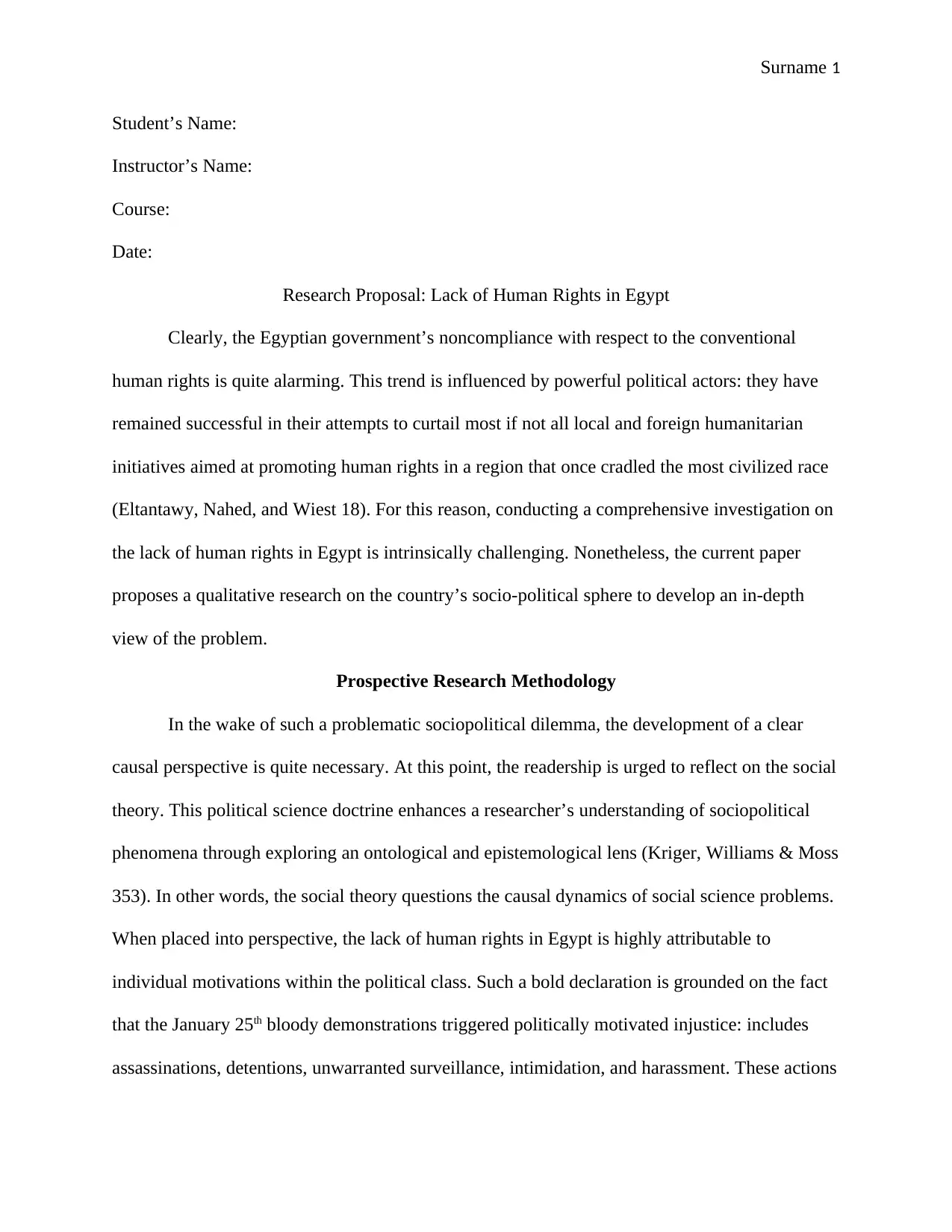
Surname 1
Student’s Name:
Instructor’s Name:
Course:
Date:
Research Proposal: Lack of Human Rights in Egypt
Clearly, the Egyptian government’s noncompliance with respect to the conventional
human rights is quite alarming. This trend is influenced by powerful political actors: they have
remained successful in their attempts to curtail most if not all local and foreign humanitarian
initiatives aimed at promoting human rights in a region that once cradled the most civilized race
(Eltantawy, Nahed, and Wiest 18). For this reason, conducting a comprehensive investigation on
the lack of human rights in Egypt is intrinsically challenging. Nonetheless, the current paper
proposes a qualitative research on the country’s socio-political sphere to develop an in-depth
view of the problem.
Prospective Research Methodology
In the wake of such a problematic sociopolitical dilemma, the development of a clear
causal perspective is quite necessary. At this point, the readership is urged to reflect on the social
theory. This political science doctrine enhances a researcher’s understanding of sociopolitical
phenomena through exploring an ontological and epistemological lens (Kriger, Williams & Moss
353). In other words, the social theory questions the causal dynamics of social science problems.
When placed into perspective, the lack of human rights in Egypt is highly attributable to
individual motivations within the political class. Such a bold declaration is grounded on the fact
that the January 25th bloody demonstrations triggered politically motivated injustice: includes
assassinations, detentions, unwarranted surveillance, intimidation, and harassment. These actions
Student’s Name:
Instructor’s Name:
Course:
Date:
Research Proposal: Lack of Human Rights in Egypt
Clearly, the Egyptian government’s noncompliance with respect to the conventional
human rights is quite alarming. This trend is influenced by powerful political actors: they have
remained successful in their attempts to curtail most if not all local and foreign humanitarian
initiatives aimed at promoting human rights in a region that once cradled the most civilized race
(Eltantawy, Nahed, and Wiest 18). For this reason, conducting a comprehensive investigation on
the lack of human rights in Egypt is intrinsically challenging. Nonetheless, the current paper
proposes a qualitative research on the country’s socio-political sphere to develop an in-depth
view of the problem.
Prospective Research Methodology
In the wake of such a problematic sociopolitical dilemma, the development of a clear
causal perspective is quite necessary. At this point, the readership is urged to reflect on the social
theory. This political science doctrine enhances a researcher’s understanding of sociopolitical
phenomena through exploring an ontological and epistemological lens (Kriger, Williams & Moss
353). In other words, the social theory questions the causal dynamics of social science problems.
When placed into perspective, the lack of human rights in Egypt is highly attributable to
individual motivations within the political class. Such a bold declaration is grounded on the fact
that the January 25th bloody demonstrations triggered politically motivated injustice: includes
assassinations, detentions, unwarranted surveillance, intimidation, and harassment. These actions
Paraphrase This Document
Need a fresh take? Get an instant paraphrase of this document with our AI Paraphraser
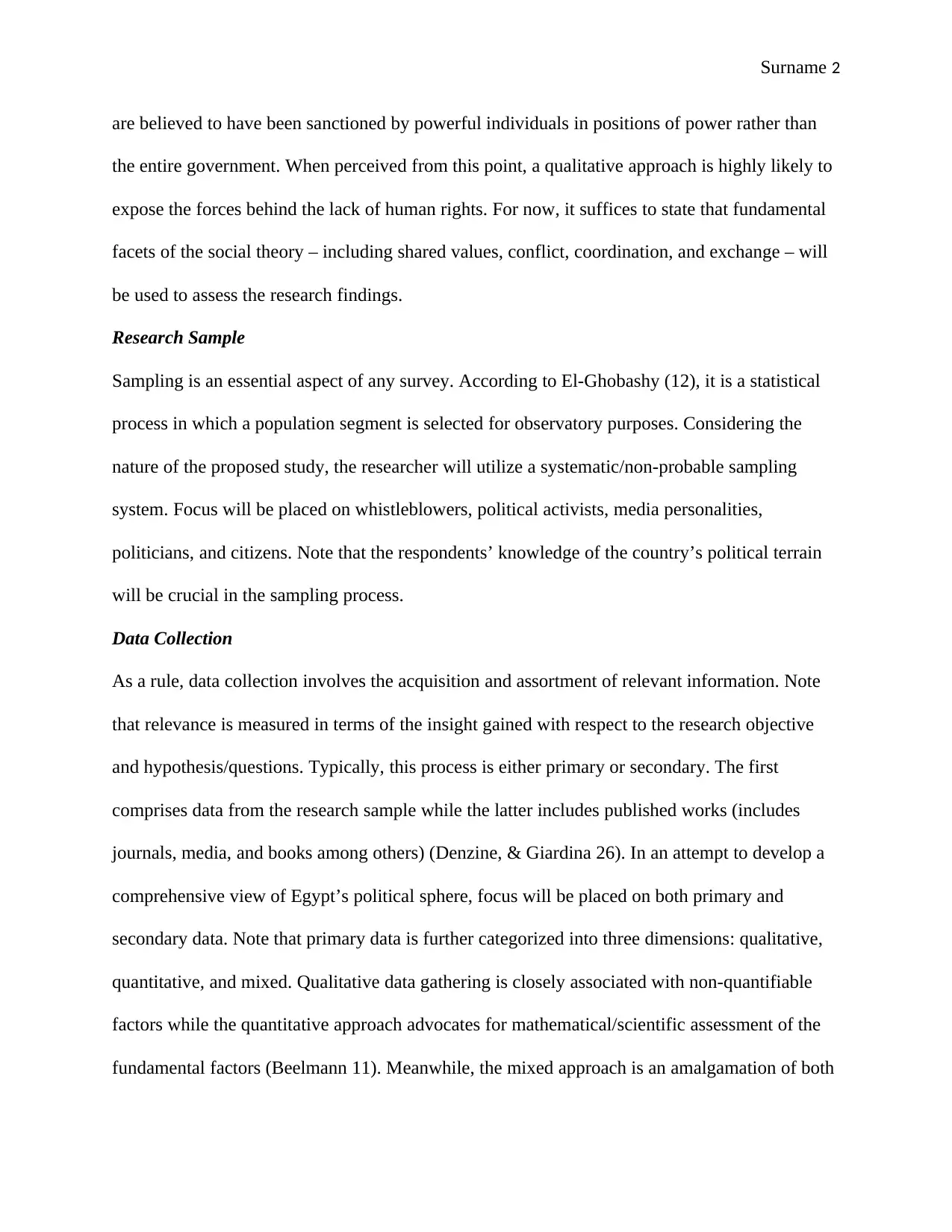
Surname 2
are believed to have been sanctioned by powerful individuals in positions of power rather than
the entire government. When perceived from this point, a qualitative approach is highly likely to
expose the forces behind the lack of human rights. For now, it suffices to state that fundamental
facets of the social theory – including shared values, conflict, coordination, and exchange – will
be used to assess the research findings.
Research Sample
Sampling is an essential aspect of any survey. According to El-Ghobashy (12), it is a statistical
process in which a population segment is selected for observatory purposes. Considering the
nature of the proposed study, the researcher will utilize a systematic/non-probable sampling
system. Focus will be placed on whistleblowers, political activists, media personalities,
politicians, and citizens. Note that the respondents’ knowledge of the country’s political terrain
will be crucial in the sampling process.
Data Collection
As a rule, data collection involves the acquisition and assortment of relevant information. Note
that relevance is measured in terms of the insight gained with respect to the research objective
and hypothesis/questions. Typically, this process is either primary or secondary. The first
comprises data from the research sample while the latter includes published works (includes
journals, media, and books among others) (Denzine, & Giardina 26). In an attempt to develop a
comprehensive view of Egypt’s political sphere, focus will be placed on both primary and
secondary data. Note that primary data is further categorized into three dimensions: qualitative,
quantitative, and mixed. Qualitative data gathering is closely associated with non-quantifiable
factors while the quantitative approach advocates for mathematical/scientific assessment of the
fundamental factors (Beelmann 11). Meanwhile, the mixed approach is an amalgamation of both
are believed to have been sanctioned by powerful individuals in positions of power rather than
the entire government. When perceived from this point, a qualitative approach is highly likely to
expose the forces behind the lack of human rights. For now, it suffices to state that fundamental
facets of the social theory – including shared values, conflict, coordination, and exchange – will
be used to assess the research findings.
Research Sample
Sampling is an essential aspect of any survey. According to El-Ghobashy (12), it is a statistical
process in which a population segment is selected for observatory purposes. Considering the
nature of the proposed study, the researcher will utilize a systematic/non-probable sampling
system. Focus will be placed on whistleblowers, political activists, media personalities,
politicians, and citizens. Note that the respondents’ knowledge of the country’s political terrain
will be crucial in the sampling process.
Data Collection
As a rule, data collection involves the acquisition and assortment of relevant information. Note
that relevance is measured in terms of the insight gained with respect to the research objective
and hypothesis/questions. Typically, this process is either primary or secondary. The first
comprises data from the research sample while the latter includes published works (includes
journals, media, and books among others) (Denzine, & Giardina 26). In an attempt to develop a
comprehensive view of Egypt’s political sphere, focus will be placed on both primary and
secondary data. Note that primary data is further categorized into three dimensions: qualitative,
quantitative, and mixed. Qualitative data gathering is closely associated with non-quantifiable
factors while the quantitative approach advocates for mathematical/scientific assessment of the
fundamental factors (Beelmann 11). Meanwhile, the mixed approach is an amalgamation of both
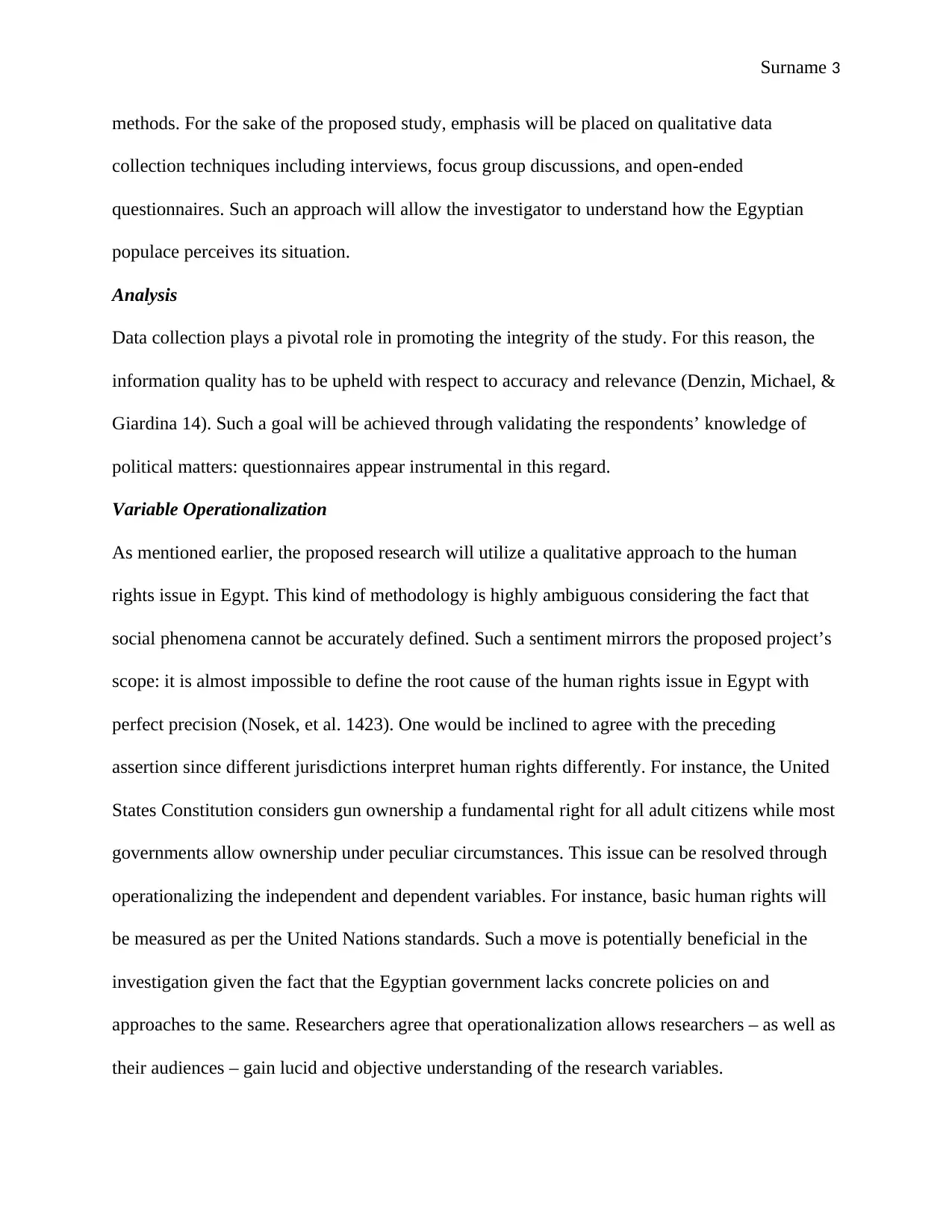
Surname 3
methods. For the sake of the proposed study, emphasis will be placed on qualitative data
collection techniques including interviews, focus group discussions, and open-ended
questionnaires. Such an approach will allow the investigator to understand how the Egyptian
populace perceives its situation.
Analysis
Data collection plays a pivotal role in promoting the integrity of the study. For this reason, the
information quality has to be upheld with respect to accuracy and relevance (Denzin, Michael, &
Giardina 14). Such a goal will be achieved through validating the respondents’ knowledge of
political matters: questionnaires appear instrumental in this regard.
Variable Operationalization
As mentioned earlier, the proposed research will utilize a qualitative approach to the human
rights issue in Egypt. This kind of methodology is highly ambiguous considering the fact that
social phenomena cannot be accurately defined. Such a sentiment mirrors the proposed project’s
scope: it is almost impossible to define the root cause of the human rights issue in Egypt with
perfect precision (Nosek, et al. 1423). One would be inclined to agree with the preceding
assertion since different jurisdictions interpret human rights differently. For instance, the United
States Constitution considers gun ownership a fundamental right for all adult citizens while most
governments allow ownership under peculiar circumstances. This issue can be resolved through
operationalizing the independent and dependent variables. For instance, basic human rights will
be measured as per the United Nations standards. Such a move is potentially beneficial in the
investigation given the fact that the Egyptian government lacks concrete policies on and
approaches to the same. Researchers agree that operationalization allows researchers – as well as
their audiences – gain lucid and objective understanding of the research variables.
methods. For the sake of the proposed study, emphasis will be placed on qualitative data
collection techniques including interviews, focus group discussions, and open-ended
questionnaires. Such an approach will allow the investigator to understand how the Egyptian
populace perceives its situation.
Analysis
Data collection plays a pivotal role in promoting the integrity of the study. For this reason, the
information quality has to be upheld with respect to accuracy and relevance (Denzin, Michael, &
Giardina 14). Such a goal will be achieved through validating the respondents’ knowledge of
political matters: questionnaires appear instrumental in this regard.
Variable Operationalization
As mentioned earlier, the proposed research will utilize a qualitative approach to the human
rights issue in Egypt. This kind of methodology is highly ambiguous considering the fact that
social phenomena cannot be accurately defined. Such a sentiment mirrors the proposed project’s
scope: it is almost impossible to define the root cause of the human rights issue in Egypt with
perfect precision (Nosek, et al. 1423). One would be inclined to agree with the preceding
assertion since different jurisdictions interpret human rights differently. For instance, the United
States Constitution considers gun ownership a fundamental right for all adult citizens while most
governments allow ownership under peculiar circumstances. This issue can be resolved through
operationalizing the independent and dependent variables. For instance, basic human rights will
be measured as per the United Nations standards. Such a move is potentially beneficial in the
investigation given the fact that the Egyptian government lacks concrete policies on and
approaches to the same. Researchers agree that operationalization allows researchers – as well as
their audiences – gain lucid and objective understanding of the research variables.
⊘ This is a preview!⊘
Do you want full access?
Subscribe today to unlock all pages.

Trusted by 1+ million students worldwide
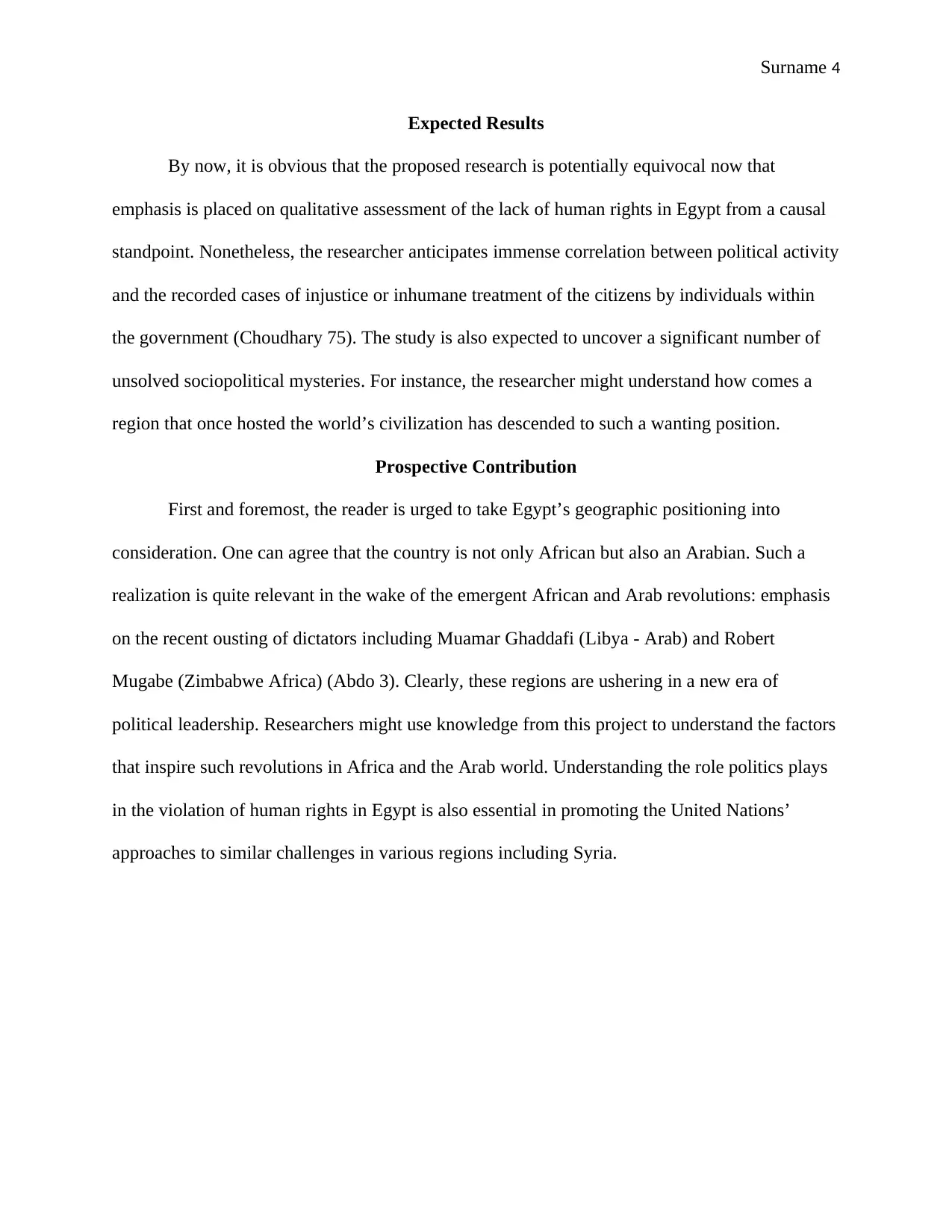
Surname 4
Expected Results
By now, it is obvious that the proposed research is potentially equivocal now that
emphasis is placed on qualitative assessment of the lack of human rights in Egypt from a causal
standpoint. Nonetheless, the researcher anticipates immense correlation between political activity
and the recorded cases of injustice or inhumane treatment of the citizens by individuals within
the government (Choudhary 75). The study is also expected to uncover a significant number of
unsolved sociopolitical mysteries. For instance, the researcher might understand how comes a
region that once hosted the world’s civilization has descended to such a wanting position.
Prospective Contribution
First and foremost, the reader is urged to take Egypt’s geographic positioning into
consideration. One can agree that the country is not only African but also an Arabian. Such a
realization is quite relevant in the wake of the emergent African and Arab revolutions: emphasis
on the recent ousting of dictators including Muamar Ghaddafi (Libya - Arab) and Robert
Mugabe (Zimbabwe Africa) (Abdo 3). Clearly, these regions are ushering in a new era of
political leadership. Researchers might use knowledge from this project to understand the factors
that inspire such revolutions in Africa and the Arab world. Understanding the role politics plays
in the violation of human rights in Egypt is also essential in promoting the United Nations’
approaches to similar challenges in various regions including Syria.
Expected Results
By now, it is obvious that the proposed research is potentially equivocal now that
emphasis is placed on qualitative assessment of the lack of human rights in Egypt from a causal
standpoint. Nonetheless, the researcher anticipates immense correlation between political activity
and the recorded cases of injustice or inhumane treatment of the citizens by individuals within
the government (Choudhary 75). The study is also expected to uncover a significant number of
unsolved sociopolitical mysteries. For instance, the researcher might understand how comes a
region that once hosted the world’s civilization has descended to such a wanting position.
Prospective Contribution
First and foremost, the reader is urged to take Egypt’s geographic positioning into
consideration. One can agree that the country is not only African but also an Arabian. Such a
realization is quite relevant in the wake of the emergent African and Arab revolutions: emphasis
on the recent ousting of dictators including Muamar Ghaddafi (Libya - Arab) and Robert
Mugabe (Zimbabwe Africa) (Abdo 3). Clearly, these regions are ushering in a new era of
political leadership. Researchers might use knowledge from this project to understand the factors
that inspire such revolutions in Africa and the Arab world. Understanding the role politics plays
in the violation of human rights in Egypt is also essential in promoting the United Nations’
approaches to similar challenges in various regions including Syria.
Paraphrase This Document
Need a fresh take? Get an instant paraphrase of this document with our AI Paraphraser
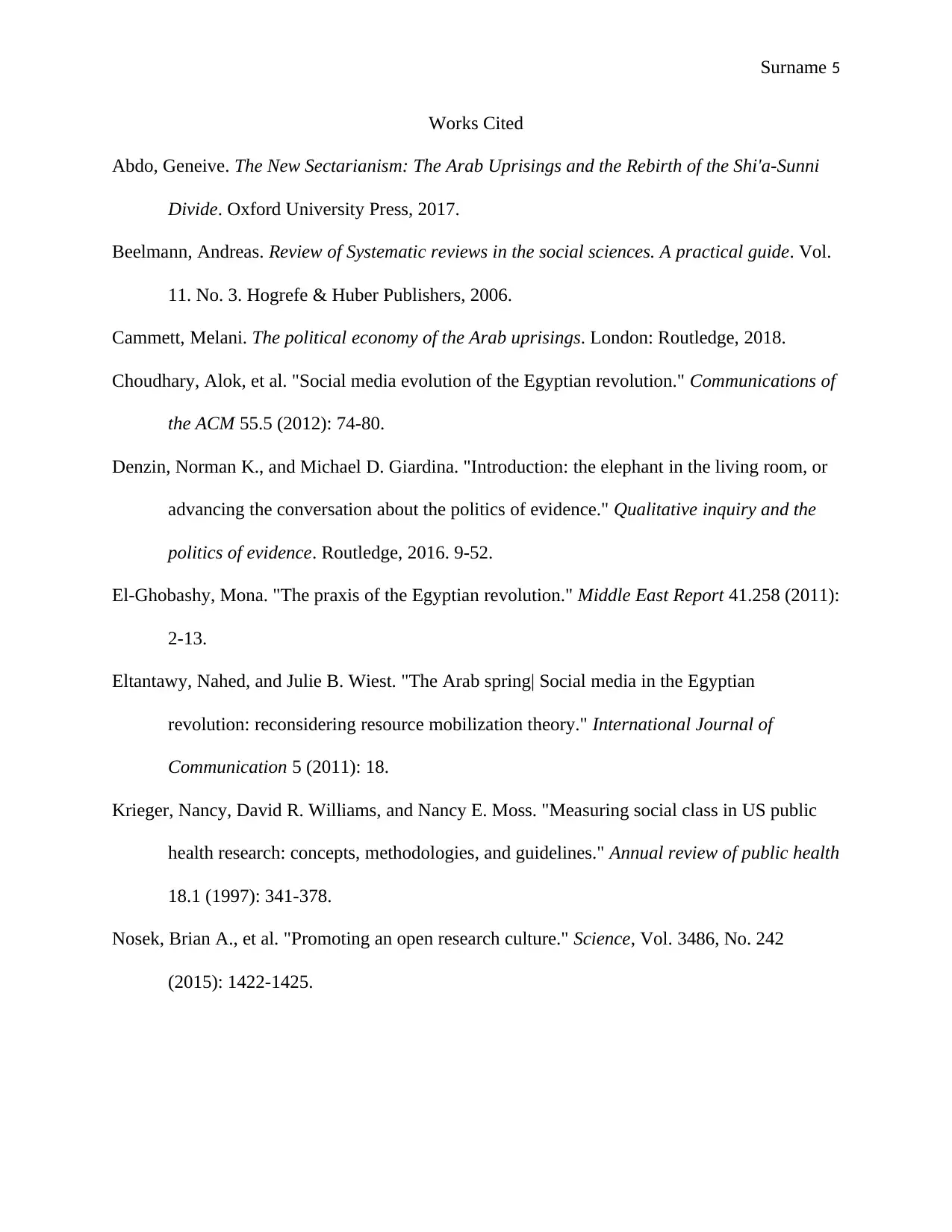
Surname 5
Works Cited
Abdo, Geneive. The New Sectarianism: The Arab Uprisings and the Rebirth of the Shi'a-Sunni
Divide. Oxford University Press, 2017.
Beelmann, Andreas. Review of Systematic reviews in the social sciences. A practical guide. Vol.
11. No. 3. Hogrefe & Huber Publishers, 2006.
Cammett, Melani. The political economy of the Arab uprisings. London: Routledge, 2018.
Choudhary, Alok, et al. "Social media evolution of the Egyptian revolution." Communications of
the ACM 55.5 (2012): 74-80.
Denzin, Norman K., and Michael D. Giardina. "Introduction: the elephant in the living room, or
advancing the conversation about the politics of evidence." Qualitative inquiry and the
politics of evidence. Routledge, 2016. 9-52.
El-Ghobashy, Mona. "The praxis of the Egyptian revolution." Middle East Report 41.258 (2011):
2-13.
Eltantawy, Nahed, and Julie B. Wiest. "The Arab spring| Social media in the Egyptian
revolution: reconsidering resource mobilization theory." International Journal of
Communication 5 (2011): 18.
Krieger, Nancy, David R. Williams, and Nancy E. Moss. "Measuring social class in US public
health research: concepts, methodologies, and guidelines." Annual review of public health
18.1 (1997): 341-378.
Nosek, Brian A., et al. "Promoting an open research culture." Science, Vol. 3486, No. 242
(2015): 1422-1425.
Works Cited
Abdo, Geneive. The New Sectarianism: The Arab Uprisings and the Rebirth of the Shi'a-Sunni
Divide. Oxford University Press, 2017.
Beelmann, Andreas. Review of Systematic reviews in the social sciences. A practical guide. Vol.
11. No. 3. Hogrefe & Huber Publishers, 2006.
Cammett, Melani. The political economy of the Arab uprisings. London: Routledge, 2018.
Choudhary, Alok, et al. "Social media evolution of the Egyptian revolution." Communications of
the ACM 55.5 (2012): 74-80.
Denzin, Norman K., and Michael D. Giardina. "Introduction: the elephant in the living room, or
advancing the conversation about the politics of evidence." Qualitative inquiry and the
politics of evidence. Routledge, 2016. 9-52.
El-Ghobashy, Mona. "The praxis of the Egyptian revolution." Middle East Report 41.258 (2011):
2-13.
Eltantawy, Nahed, and Julie B. Wiest. "The Arab spring| Social media in the Egyptian
revolution: reconsidering resource mobilization theory." International Journal of
Communication 5 (2011): 18.
Krieger, Nancy, David R. Williams, and Nancy E. Moss. "Measuring social class in US public
health research: concepts, methodologies, and guidelines." Annual review of public health
18.1 (1997): 341-378.
Nosek, Brian A., et al. "Promoting an open research culture." Science, Vol. 3486, No. 242
(2015): 1422-1425.
1 out of 5
Related Documents
Your All-in-One AI-Powered Toolkit for Academic Success.
+13062052269
info@desklib.com
Available 24*7 on WhatsApp / Email
![[object Object]](/_next/static/media/star-bottom.7253800d.svg)
Unlock your academic potential
Copyright © 2020–2026 A2Z Services. All Rights Reserved. Developed and managed by ZUCOL.



